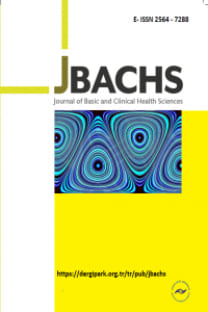Nurses’ Knowledge, Attitudes and Opinions Towards Clinical Research: A Cross-Sectional Study in a University Hospital
Nurses’ Knowledge, Attitudes and Opinions Towards Clinical Research: A Cross-Sectional Study in a University Hospital
___
- 1. Downing A, Morris EJ, Corrigan N, et al. High hospital research participation and improved colorectal cancer survival outcomes: a population-based study. Gut 2017;66:89–96. [CrossRef]
- 2. Gallin JI, Ognibene FP. Principles and Practice of Clinical Research, 3rd ed. London: Elsevier/Academic Press; 2012.
- 3. Grady C, Edgerly M. Science, technology, and innovation: Nursing responsibilities in clinical research. Nurs Clin North Am 2009;44:471– 481. [CrossRef]
- 4. Green L. Explaining the role of the nurse in clinical trials. Nurs Stand 2011;25:35–39. [CrossRef]
- 5. Dhodi DK, Thakkar KB, Billa G, Khobragade AA, Sinha SR, Patel SB. Knowledge, attitude & practices of medical students and teachers towards clinical research in a tertiary care hospital in Mumbai -cross sectional survey. J Contemp Med Edu 2013;1:238–244. [CrossRef]
- 6. Roll L, Stegenga K, Hendricks-Ferguson V, et al. Engaging nurses in research for a randomized clinical trial of a behavioral health intervention. Nurs Res Pract 2013;2013:183984. [CrossRef]
- 7. Bevans M, Hastings C, Wehrlen L, et al. Defining clinical research nursing practice: results of a role delineation study. Clin Transl Sci 2011;4:421–427. [CrossRef]
- 8. Castro K, Bevans M, Miller-Davis C, et al. Validating the clinical research nursing domain of practice. Oncol Nurs Forum 2011;38:E72– E80. [CrossRef]
- 9. Gibbs CL, Lowton K. The role of the clinical research nurse. Nurs Stand 2012;26:37–40. [CrossRef]
- 10. Hastings CE, Fisher CA, McCabe MA, et al. Clinical research nursing: a critical resource in the national research enterprise. Nurs Outlook 2012;60:149–156. [CrossRef]
- 11. Kenkre JE, Chatfield D. Study site co-ordinator/Clinical research nurse; A career for nurses in the pharmaceutical industry? CRfocus 2004;15:5–9.
- 12. Spilsbury K, Petherick E, Cullum N, Nelson A, Nixon J, Mason S. The role and potential contribution of clinical research nurses to clinical trials. J Clin Nurs 2008;17:549–557. [CrossRef]
- 13. Matsumoto K, Nagamura F, Ogami Y, Yamashita N, Kamibeppu K. Difficulties of nursing staff involved in phase 1 oncology trials in Japan. Cancer Nurs 2011;4:369–375. [CrossRef]
- 14. Zhang J, Zhang H, Yu C, Li J, Jiang Y. The attitudes of oncology physicians and nurses toward phase I, II, and III cancer clinical trials. Contemp Clin Trials 2011;32:649–653. [CrossRef]
- 15. Flocke SA, Antognoli E, Daly BJ, et al. The Role of Oncology Nurses in Discussing Clinical Trials. Oncol Nurs Forum 2017;44:547–552. [CrossRef]
- 16. Bulut Aksoy H, Gelal A. Role of the Clinical Research Nurse: Review. Turkiye Klinikleri J Nurs Sci 2016;8:271–276. [CrossRef]
- 17. Burnett CB, Koczwara B, Pixley L, Blumenson LE, Hwang YT, Meropol NJ. Nurses’ attitudes toward clinical trials at a comprehensive cancer center. Oncol Nurs Forum 2001;28:1187–1192.
- 18. Yanagawa H, Takai S, Yoshimaru M, Miyamoto T, Katashima R, Kida K Nurse awareness of clinical research: a survey in a Japanese University Hospital. BMC Med Res Methodol 2014;14:85. [CrossRef]
- 19. MacLean S, Désy P, Juarez A, Perhats C, Gacki-Smith J. Research education needs of pediatric emergency nurses. J Emerg Nurs 2006;32:17–22. [CrossRef]
- 20. Ulrich CM, Zhou Q, Ratcliffe SJ, Ye L, Grady C, Watkins-Bruner D. Nurse practitioners’ attitudes about cancer clinical trials and willingness to recommend research participation. Contemp Clin Trials 2012;33:76–84. [CrossRef]
- 21. Michaels M, D’Agostino TA, Blakeney N, et al. Impact of primary care provider knowledge, attitudes, and beliefs about cancer clinical trials: implications for referral, education and advocacy. J Cancer Educ 2015;30:152–157. [CrossRef]
- 22. Rice J, Cheak TL. The role of nursing in hospital-based clinical research. The Am J Nurs 2000;100:24E-24G.
- 23. Sadler GR, Lantz JM, Fullerton JT, Dault Y. Nurses’ unique roles in randomized clinical trials. J Prof Nurs 1999;15:106–115.
- 24. Poat A, McElligott M, Fleming V. How midwives’ attitudes can affect the research process. Br J Midwifery 2013;11:396–400. [CrossRef]
- 25. Caldwell B, Coltart K, Hutchison C, et al. Research awareness, attitudes and barriers among clinical staff in a regional cancer centre. Part 1: a quantitative analysis. Eur J Cancer Care (Engl) 2017;26. [CrossRef]
- 26. Johnson C, Lizama C, Harrison M, Bayly E, Bowyer J, Haddow L. Cancer health professionals need funding, time, research knowledge and skills to be involved in health services research. J Cancer Educ 2014;29:389–394. [CrossRef]
- 27. Stephens-Lloyd A. The extended role of the clinical research nurse: Building an evidence base for practice. Res Nurs Health 2004;9(1):18– 27. [CrossRef]
- 28. McSherry R, Artley A, Holloran J. Research awareness: An important factor for evidence-based practice? Worldviews Evid Based Nurs 2006;3:103–115. [CrossRef]
- 29. Ooi CC, Lee SHE, Soh BP. A survey on the research awareness and readiness among radiographers in Singapore General Hospital (SGH). Radiography 2012;18:264–269. [CrossRef]
- Yayın Aralığı: Yılda 3 Sayı
- Başlangıç: 2016
- Yayıncı: DOKUZ EYLÜL ÜNİVERSİTESİ
Urinary Retention Due to Recto-Vesical Haematoma After Laparoscopic Appendectomy
Ayşe GELAL, Reyhan UÇKU, Hacer BULUT AKSOY, M. Aylin ARİCİ
Evaluation of Rare Antinuclear Antibody Patterns in a Tertiary Hospital in İzmir
Mainul HAQUE, Nur Syamirah AISHAH BINTI OTHMAN, Siti Nur Najihah LUTFI, Md Zakirul ISLAM, Nor Azlina A RAHMAN, Golam Mohammad KIBRIA, ATM Emdadul HAQUE, Md Anwarul Azim MAJUMDER, Justin V GNANOU
Mainul HAQUE, Nur Syamirah Aishah Binti OTHMAN, Siti Nur Najihah LUTFİ, Md Zakirul ISLAM, Nor Azlina A RAHMAN, Golam Mohammad KİBRİA, Atm Emdadul HAQUE, Md Anwarul Azim MAJUMDER, Justin V GNANOU
The Effects of Age On Static and Dynamic Postural Balance After Total Knee Arthroplasty
Hacer Bulut AKSOY, M. Aylin ARİCİ, Reyhan UCKU, Ayse GELAL
Gökşin Nilüfer YONGUÇ, Sibel CİRPAN, Salih SAYHAN, Canan EYÜBOĞLU, Mustafa GÜVENÇER
